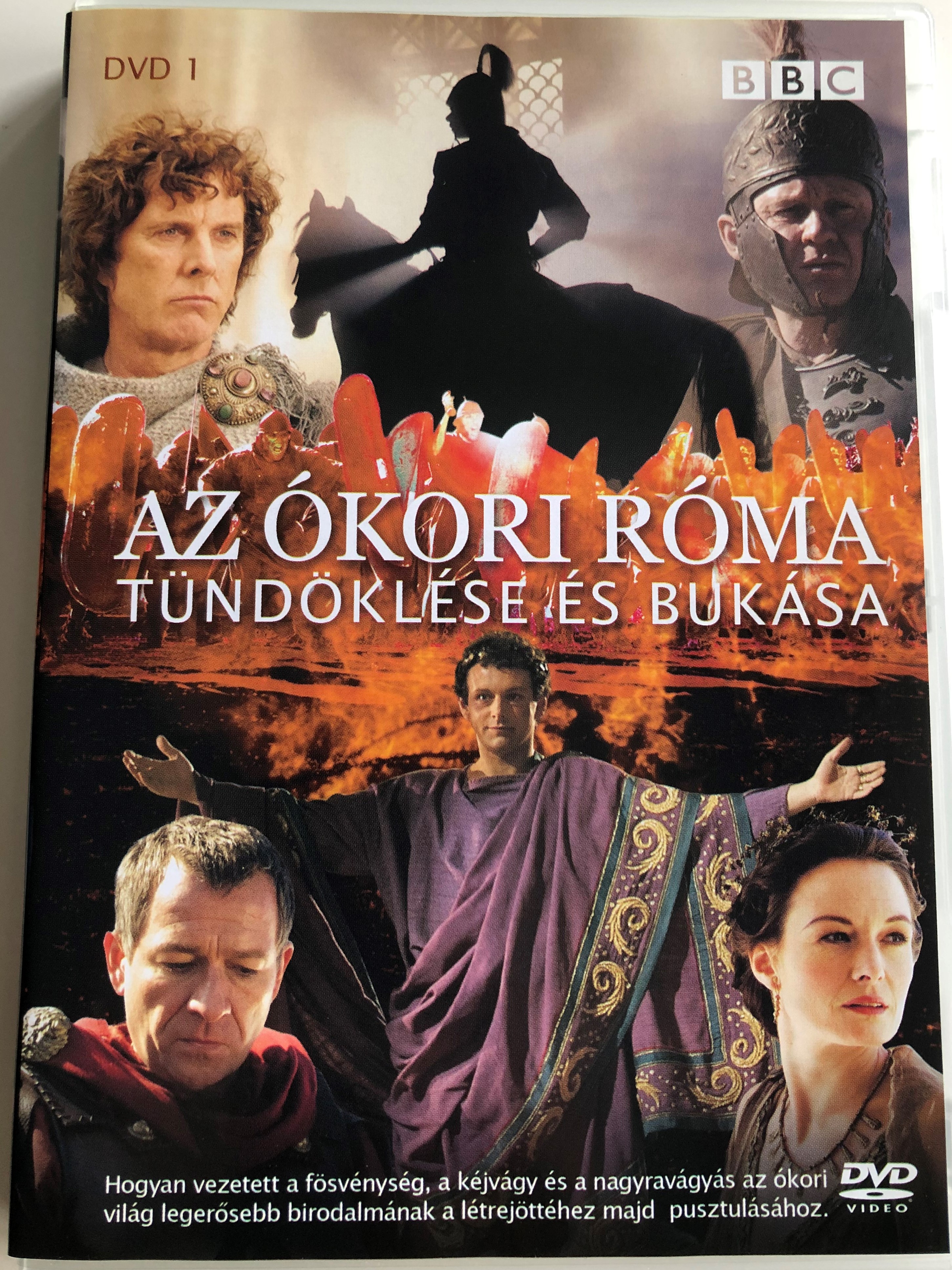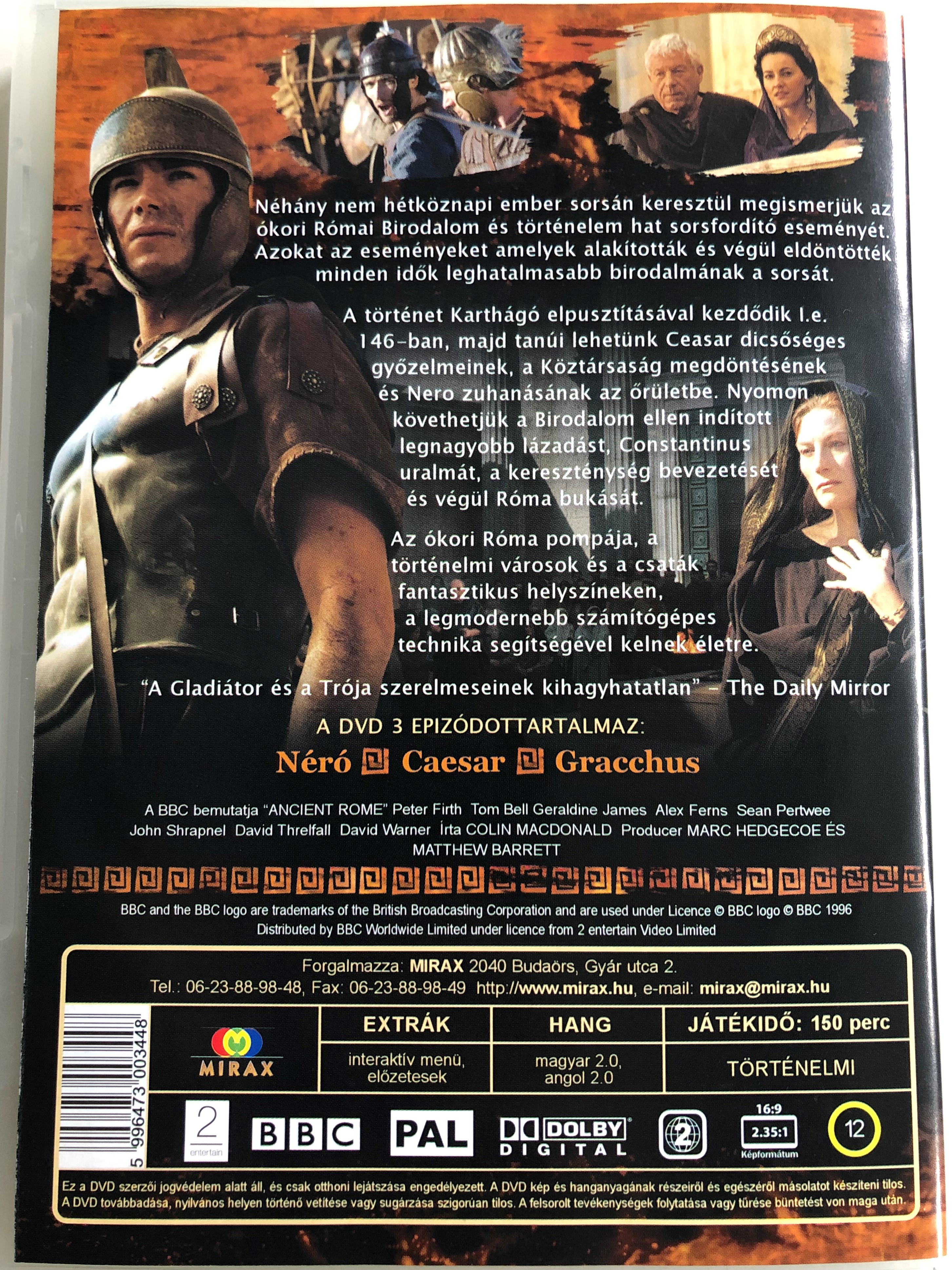Description
Ancient Rome The Rise and Fall of an Empire DVD 2006 Az ókori Róma Tündöklése és Bukása Disc 1. / BBC / Directed by Peter Firth / Starring: Sean Pertwee, Catherine McCormack, Michael Sheen, David Threlfall / Docudrama series / 3 episodes on disc
UPC 5996473003448 / 5996051450084
REGION 2 PAL DVD
MADE IN HUNGARY
AUDIO: English 2.0, Hungarian 2.0
RUN TIME: 150 minutes
NARRATED BY ALISDAIR SIMPSON
English Summary:
Ancient Rome: The Rise and Fall of an Empire is a 2006 BBC One docudrama series, with each episode looking at a different key turning points in the history of the Roman Empire. This docudrama focuses on the Latin western half of the Roman Empire.
Hungarian Summary:
Néhány nem hétköznapi ember sorsán keresztül megismerjük az ókori Római Birodalom és történelem hat sorsfordító eseményét. Azokat az eseményeket amelyek alakították és végül eldöntötték minden idők leghatalmasabb birodalmának a sorsát.
Episode one: Caesar
This is the story of the most famous Roman of them all, how he risked everything to tear down the government he served and bring revolution to Rome.
— Alisdair Simpson’s opening narration
At the close of the Gallic Wars, Gaius Julius Caesar finds his army encircled by a massive force of Gauls but wins a decisive victory with a brilliant counterattack at the Battle of Alesia. An inspiring speech to his troops, promising to rescue Rome from its corrupt rulers and restore it to its people, raises opposition from Senators Cato and Marcellus. Caesar refuses to disband his army before crossing the Rubicon, plunging the Republic into civil war and turning his deputy Labienus and old friend Pompey against him. Caesar captures Rome unopposed after Pompey is forced to withdraw his vastly outnumbered legions and the senators and people flee.
Caesar seizes the emergency funds from the treasury to fund his campaign, but, failing to pay off his soldiers, is later forced to decimate his own rebellious Ninth Legion. Pompey amasses a huge army in Greece while Caesar leads a one-year campaign against opposition in Spain. In Greece, Caesar is forced to retreat inland by Pompey at the Battle of Dyrrachium but is victorious when the Senators force Pompey into an impetuous attack at the Battle of Pharsalus. Caesar overturns the Republic and has himself made dictator for life (essentially the first emperor), only to be assassinated by rivals just four years into his rule.
Cast
|
Crew |
|
Episode two: Nero
This is the story of what happened when the most powerful man on Earth lost his mind and brought the Empire to the brink of destruction.
— Alisdair Simpson’s opening narration
Nero witnesses the Great Fire of Rome from his villa in Antium and hurries back to the capital to try to control the fire and save lives. Seneca tells him to "rule like the gods" and he vows to build an inspirational city of marble and stone on the ruins. The expense threatens to bankrupt the empire and Tigellinus is sent to rob the temples, turning many in the senate against the emperor. The Pisonian conspiracy to assassinate Nero and have Gaius Calpurnius Piso proclaimed as emperor is revealed, and the conspirators, including the trusted Seneca, are executed.
Nero inaugurates the biggest arts festival in Roman history with himself at the top of the bill. In the furious throes of increasing megalomania he kicks his wife Poppea to death. A now isolated Nero leaves Rome in the hands of the Senate as he sets out on a debauched tour of the empire. With his reconstruction still incomplete as the money runs out, Tigellinus is ordered to initiate a campaign of forced suicide to dispossess the richest men in the empire. A rebellion rises up and the Senate sentences the fleeing Nero to death, his suicide bringing the Julio-Claudian dynasty to an end.
Cast |
|
Crew |
- Historical consultant: Mary Beard
- Writer & director: Nick Murphy
Episode four: Revolution
In an age before Rome was ruled by emperors young Tiberius Gracchus had been brought up to respect his father’s principles of honour and justice, but in just 20 years he will die defending his father’s ideals, murdered by the aristocrats standing behind him, his crime; starting a revolution so powerful it changed Rome forever, setting on the path to its greatest triumphs and worst excesses.
— Alisdair Simpson’s opening narration
Tiberius Sempronius Gracchus first makes a mark on history winning the golden crown from General Scipio Aemilianus by being first over the wall at the victorious Battle of Carthage. Back in Rome, now the "capital of the world", he finds the growing gap between rich and poor threatening the foundations of the republic. Urged to achieve greatness through further military exploits, he sets out with reinforcements for the campaign of General Gaius Hostilius Mancinus against the rebellious Numantine tribe in Spain but is defeated and forced to negotiate a peace treaty that the Senate later refuses to ratify.
His actions, while repudiated in the Senate, have made him a hero amongst the Roman people and his new father-in-law Senator Appius Claudius Pulcher supports him in a successful campaign to become their Tribune. He snubs the Senate and takes his proposed land reforms directly to the People's Assembly, where his old friend Octavius vetoes them. He brings the city to a standstill when he vetoes all other business in response and has Octavius deposed. Octavius and the Senate spread false rumours that he intends to make himself king and in the ensuing unrest he is murdered.
Cast |
|
Crew |
- Historical consultant: Mary Beard
- Producer, director & writer: Christopher Spencer























